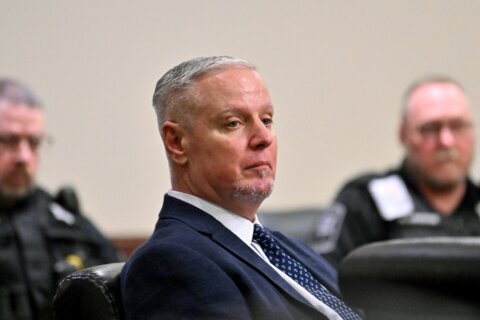This video is no longer available.
American University students are using Taylor Swift to learn about economics by examining her star power’s impact on the market.
On the first day of “Switftonomics: The Economics of Taylor Swift,” Economics Department Chair Kara Reynolds sent students home with kits to make friendship bracelets — except unlike the ones from “The Eras Tour” that were modeled off Swift’s memorable songs, these spelled out economic concepts like “demand” and “inflation” instead.
“I spent the afternoon painstakingly stringing every one on, and it was so nice of her to do that for all the 40 students here,” said student Teddy Gillman.
Those bracelets set the tone for “Switftonomics: The Economics of Taylor Swift.”
As WTOP previously reported, students in the class are applying economics to parts of Swift’s career, including her re-recordings, and of course, her record-breaking Eras Tour.
Two AU students, Megan Wysocki and Mackenzie Shultz, designed the class for a course competition last spring and their concept won.
Wysocki said the course’s subject matter peaked the interest of some students who haven’t taken a higher level economics course before.
“This is getting people’s foot in the door of understanding that economics never stops. It’s everywhere,” Wysocki said.
The enchanted course offering was initially supposed to be a one-hit wonder, but it garnered such a big reputation on campus that Reynolds will teach it again next semester to accommodate students that are hoping to take the course.
“I can’t wait to see the next group. Actually, I would love to teach it forever,” Reynolds said.
Shultz said some of her friends enrolled in the economic prerequisite this fall with hopes of enrolling in Swiftonomics this spring.
“I think people see economics as a scary thing with a lot of numbers and it’s very complicated, but when you kind of pull apart the things that you enjoy out in the world, you can connect those and make it much simpler and more enjoyable,” Shultz said.
What’s going on in the classroom?
Each class is themed after a different Swift album.
“It’s a lot more fun than regular economics,” Gillman said.
Reynolds plays music as students enter. There’s an ice breaker question, such as “What Taylor Swift song describes your feelings today?” before they get down to business. Reynolds then teaches a lecture on an economic concept, such as supply and demand.
During this week’s class session, students learned about externalities from the Eras Tour. The economic spillovers were on the agenda.
“When someone buys a ticket to a concert, they don’t just contribute the economic impact of that ticket,” Gillman explained of the economic concept. “If they travel, if they stay in a hotel, that helps the economy. If they dine out, they are employing workers in that respect.”
The class also looked at the cost of the tour, including possible environmental impacts of the production and concertgoers.
“It’s a very meaningful economic phenomenon, and especially with how she has rerecorded her albums and has disrupted the industry, it has potential to reshape things for years to come,” Gillman said.
Over the past three weeks, Reynolds said the class has also gone over the Ticketmaster scandal that snowballed after the Eras Tour concerts went on sale. And they’ve talked about how Taylor Swift likely prompted the Department of Justice suit against Live Nation and Ticketmaster.
“(In) the first week, we talked a lot about the ‘superstar economy’ and inequality in our society,” Reynolds said.
While the class is partially about friendship bracelets and album listening sessions, Gillman said it also tackles topics such as how the Eras Tour may have helped pulled the U.S. out of an economic recession.
“I would urge everyone who thinks that all this Eras Tour talk is kind of unserious and marginal to reconsider and to think about how it’s really affecting a lot of areas of economic life,” Gillman said.
Is it working?
There’s a lot of participation during the class, according to student Meg Norten.
“I always look forward to coming to class, and that says a lot, because for block classes that are over two hours long, that’s a hard thing to do for students,” she said.
Unlike other economics classes, Norten said there’s a lot of back-and-forth dialogue between students and their professor during class.
“It is a lot more … focused on just kind of making sure this is a ‘low stress, high learning’ experience for us, so that the pressure’s down, and we all just feel like we can be ourselves and just learn in the way that’s best for us,” Norten said.
The class has attracted those outside of the economics major, including students studying journalism and political science.
“The connections I’ve made and the kind of community I’ve been able to build within the class of people who have the same passions as I do, of Taylor Swift and economics, has been great,” said economics major Callie Morton.
In this classroom, female students are ‘The Man’
The class is nearly entirely made up of female students. Reynolds said that’s notable as only about 30% of economics majors are women.
The field often struggles to attract women. The professor said her students tell her, “When we’re in class, the men really suck the air out of the room.”
“To have a room of women who feel so confident talking out and giving their opinions, has been so rewarding for me as a faculty member,” said Reynolds.
Norten added that Swift is representative of the female experience, having persevered despite her experience with gender inequality and negative stereotypes.
“I think that motivates us, as a largely female class of econ students, in our own field of study in econ where women are underrepresented,” Norten said.
Norten called the popstar a role model who has broken down barriers. She wants people to think twice before mocking Swifties.
“There is something really powerful in Taylor Swift’s story,” she said. “It’s not shallow, it’s not surface level. It’s really inspiring to us. And again, she’s clearly powerful enough that we have a whole econ class on her now.”
Get breaking news and daily headlines delivered to your email inbox by signing up here.
© 2024 WTOP. All Rights Reserved. This website is not intended for users located within the European Economic Area.







